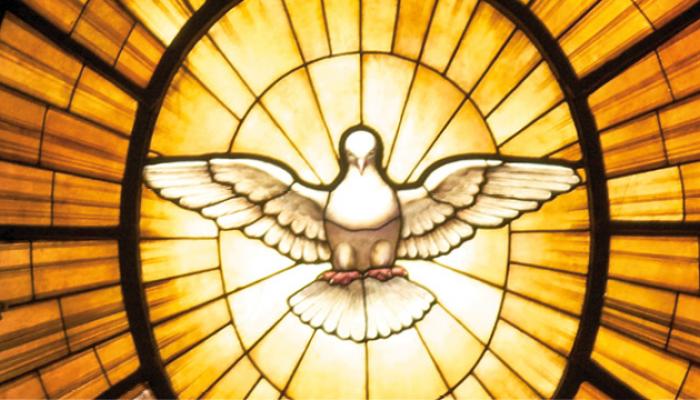
1.32 What does the Holy Spirit do? Do I need him?
The Holy Spirit helps us to live a good Christian life. We receive this help in a very special way in Baptism and Confirmation, when we also receive the gifts of the Holy Spirit. Thanks to the Holy Spirit, we can believe in God and pray to him with all our heart (I Cor. 12:3I Cor. 12:13: Therefore I want you to understand that no one speaking by the Spirit of God ever says “Jesus be cursed!” and no one can say “Jesus is Lord” except by the Holy Spirit.; Gal. 4:6Gal. 4:6: Because you are sons, God has sent the Spirit of his Son into our hearts, crying, “Abba! Father!”).
At Pentecost, the Holy Spirit is the focus of attention: we celebrate the coming of the Helper that Jesus promised his disciples (Jn. 14:16-17)Jn. 14:16-17: I will pray the Father, and he will give you another Counsellor, to be with you for ever, even the Spirit of truth, whom the world cannot receive, because it neither sees him nor knows him; you know him, for he dwells with you, and will be in you.. The Holy Spirit can help us with his gifts, such as wisdom and insight. However, the choice is up to us: we are free to cooperate with these gifts. The Holy Spirit can therefore only help us if we accept this help and try to believe.
What is the meaning of the expression “conceived by the power of the Holy Spirit...”?
This expression means that the Virgin Mary conceived the eternal Son in her womb by the power of the Holy Spirit without the cooperation of a man. The angel told her at the Annunciation that “the Holy Spirit will come upon you” (Luke 1:35). [CCCC 94]
Why is Mary a Virgin?
God willed that Jesus Christ should have a truenhuman mother but only God himself as his Father, because he wanted to make a new beginning that could be credited to him alone and not to earthly forces.
Mary’s virginity is not some outdated mythological notion but rather fundamental to the life of Jesus. He was born of a woman but had no human father. Jesus Christ is a new beginning in the world that has been instituted from on high. In the Gospel of Luke, Mary asks the angel, “How can this be, since I have no husband?” (= do not sleep with a man, Lk 1:34); the angel answered, “The holy spirit will come upon you” (Lk 1:35). Although the Church from the earliest days was mocked on account of her belief in Mary’s virginity, she has always believed that her virginity is real and not merely symbolic. [Youcat 80]
What are the seven gifts of the Holy Spirit?
The seven gifts of the Holy Spirit are wisdom, understanding, counsel, fortitude, knowledge, piety, and fear of the Lord. With these the Holy Spirit “endows” Christians, in other words, he grants them particular powers that go beyond their natural aptitudes and gives them the opportunity to become God’s special instruments in this world.
We read in one of Paul’s letters: “To one is given through the spirit the utterance of wisdom, and to another the utterance of knowledge according to the same spirit, to another faith by the same spirit, to another gifts of healing by the one spirit, to another the working of miracles, to another prophecy, to another the ability to distinguish between spirits, to another various kinds of tongues, to another the interpretation of tongues” (1 Cor 12:8–10). [Youcat 310]
What are the fruits of the Holy Spirit?
The fruits of the Holy Spirit are charity, joy, peace, patience, kindness, goodness, generosity, gentleness, faithfulness, modesty, self-control, and chastity (cf. Gal 5:22–23).
In the “fruits of the Holy Spirit” the world can see what becomes of people who let themselves be adopted, led, and completely formed by God. The fruits of the Holy Spirit show that God really plays a role in the life of Christians. [Youcat 311]
What is the effect of Confirmation?
The effect of Confirmation is a special outpouring of the Holy Spirit like that of Pentecost. This outpouring impresses on the soul an indelible character and produces a growth in the grace of Baptism. It roots the recipient more deeply in divine sonship, binds him more firmly to Christ and to the Church and reinvigorates the gifts of the Holy Spirit in his soul. It gives a special strength to witness to the Christian faith. [CCCC 268]
Who can receive this sacrament?
Only those already baptized can and should receive this sacrament which can be received only once. To receive Confirmation efficaciously the candidate must be in the state of grace. [CCCC 269]
What happens in Confirmation?
In confirmation the soul of a baptized Christian is imprinted with a permanent seal that can be received only once and marks this individual forever as a Christian. The gift of the Holy Spirit is the strength from above in which this individual puts the grace of his Baptism into practice through his life and acts as a “witness” for Christ.
To be confirmed means to make a “covenant” with God. The confirmand says, “Yes, I believe in you, my God; give me your Holy Spirit, so that I might belong entirely to you and never be separated from you and may witness to you throughout my whole life, body and soul, in my words and deeds, on good days and bad.” And God says,“Yes, I believe in you, too, my child—and I will give you my spirit, my very self. I will belong entirely to you. I will never separate myself from you, in this life or eternally in the next. I will be in your body and your soul, in your words and deeds. Even if you forget me, I will still be there—on good days and bad”. [Youcat 205]
Think first... of the original cause of all things that are made, the Father; of the creative cause, the Son; of the perfecting cause, the Spirit; so that [Creation] subsist by the Will of the Father, is brought into being by the operation of the Son, and perfected by the presence of the Spirit. [St. Basil, On the Holy Spirit, Chap. 16: 38 (MG 32, 136)]





